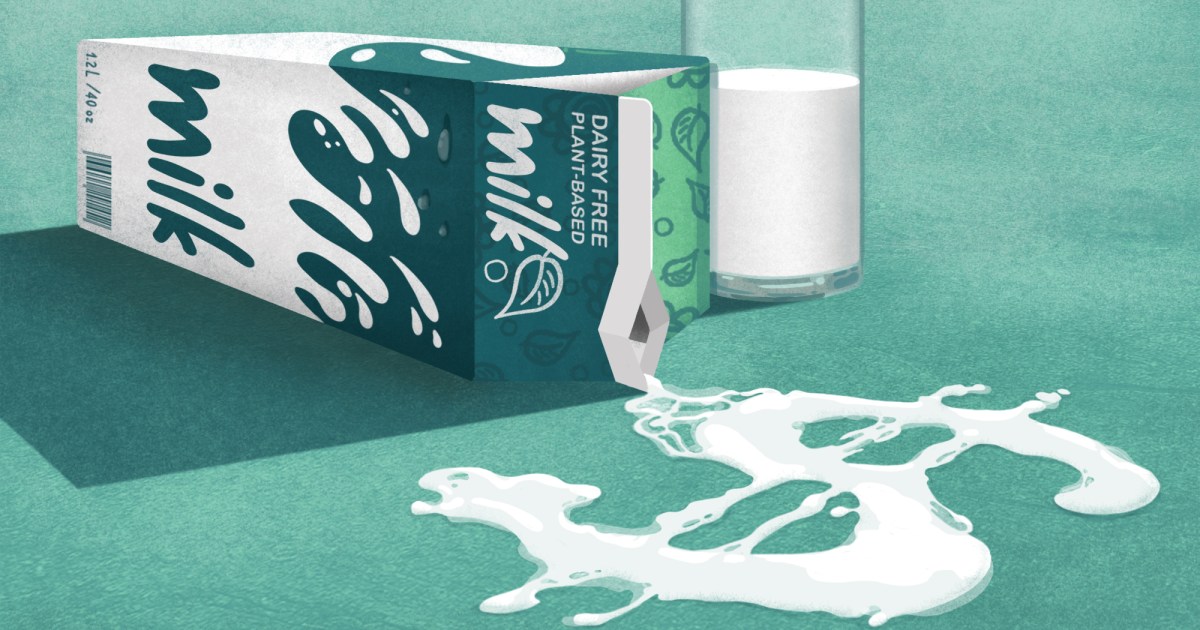Like an estimated two-thirds of the world’s population, I don’t digest lactose well, which makes the occasional latte an especially pricey proposition. So it was a pleasant surprise when, shortly after moving to San Francisco, I ordered a drink at Blue Bottle Coffee and didn’t have to ask—or pay extra—for a milk alternative. Since 2022, the once Oakland-based, now Nestlé-owned cafe chain has defaulted to oat milk, both to cut carbon emissions and because lots of its affluent-tending customers were already choosing it as their go-to.
Plant-based milks, a multibillion-dollar global market, aren’t just good for the lactose intolerant: They’re also better for the climate. Dairy cows belch a lot of methane, a greenhouse gas 25 times more potent than carbon dioxide; they contribute at least 7 percent of US methane output, the equivalent emissions of 10 million cars. Cattle need a lot of room to graze, too: Plant-based milks use about a tenth as much land to produce the same quantity of milk. And it takes almost a thousand gallons of water to manufacture a gallon of dairy milk—four times the water cost of alt-milk from oats or soy.
But if climate concerns push us toward the alt-milk aisle, dairy still has price on its side. Even though plant-based milks are generally much less resource-intensive, they’re often more expensive. Walk into any Starbucks, and you’ll likely pay around 70 cents extra for nondairy options.
. Dairy’s affordability edge, explains María Mascaraque, an analyst at market research firm Euromonitor International, relies on the industry’s ability to produce “at larger volumes, which drives down the cost per carton.” American demand for milk alternatives, though expected to grow by 10 percent a year through 2030, can’t beat those economies of scale. (Globally, alt-milks aren’t new on the scene—coconut milk is even mentioned in the Sanskrit epic Mahābhārata, which is thousands of years old.)
What else contributes to cow milk’s dominance? Dairy farmers are “political favorites,” says Daniel Sumner, a University of California, Davis, agricultural economist. In addition to support like the “Dairy Checkoff,” a joint government-industry program to promote milk products (including the “Got Milk?” campaign), they’ve long raked in direct subsidies currently worth around $1 billion a year.
Big Milk fights hard to maintain those benefits, spending more than $7 million a year on lobbying. That might help explain why the US Department of Agriculture has talked around the climate virtues of meat and dairy alternatives, refusing to factor sustainability into its dietary guidelines—and why it has featured content, such as a 2013 article by then–Agriculture Secretary Tom Vilsack, trumpeting the dairy industry as “leading the way in sustainable innovation.”
But the USDA doesn’t directly support plant-based milk. It does subsidize some alt-milk ingredients—soybean producers, like dairy, net close to $1 billion a year on average, but that crop largely goes to feeding meat- and dairy-producing livestock and extracting oil. A 2021 report by industry analysts Mintec Limited and Frost Procurement Adventurer also notes that, while the inputs for dairy (such as cattle feed) for dairy are a little more expensive than typical plant-milk ingredients, plant alternatives face higher manufacturing costs. Alt-milk makers, Sumner says, may also have thinner profit margins: Their “strategy for growth is advertisement and promotion and publicity,” which isn’t cheap.
Starbucks, though, does benefit from economies of scale. In Europe, the company is slowly dropping premiums for alt-milks, a move it attributes to wanting to lower corporate emissions. “Market-level conditions allow us to move more quickly” than other companies, a spokesperson for the coffee giant told me, but didn’t say if or when the price drop would happen elsewhere.
In the United States, meanwhile, it’s a waiting game to see whether the government or corporations drive down alt-milk costs. Currently, Sumner says, plant-based milk producers operate under an assumption that “price isn’t the main thing” for their buyers—as long as enough privileged consumers will pay up, alt-milk can fill a premium niche. But it’s going to take a bigger market than that to make real progress in curbing emissions from food.
Need to keep the ag subsidies flowing so that rural areas keep voting conservative
Removed by mod
Sorry, but that’s horseshit.
Taking away dairy subsidies would drive up milk and milk product prices, pushing more people to buy alternatives instead. Any loss of employment in the dairy industry is balanced by new jobs in manufacturing plant milks and dairy alternatives. This isn’t people being replaced by robots, it’s cows being replaced by plants. You still need pretty much the same workforce to package and distribute it regardless.
New Zealand and Australia virtually eliminated agricultural subsidies and their industries are doing just fine.
Only 1% of americans work in the primary sector and that is not only comprised of farmers. Furthermore, there are more farming products than dairy, oats for oat milk have to be farmed somewhere as well.
It’s more of a matter of if food gets more expensive you’re more likely to be voted out of office
It’s not as if Democrats don’t also throw plenty of bones to farmers.
Even if the farmers themselves are likely to be relatively conservative, they’re such a politically sympathetic group that no one wants to be seen as “going after hard-working real American farmers!”. Things like the Iowa caucuses playing a huge role in national politics don’t help either (although the Dems have thankfully killed that).
The dairy lobby in the US is huge money. If you ever want to know why we’re making a seemingly stupid decision follow the money, look at the entrenched interests and read some history. We subsidize dairy farmers because we used to subsidize dairy farmers and they spent a bunch of their earnings lobbying for more subsidies.
Granted, tobacco is far worse than dairy in its health outcomes, but imagine if big tobacco had somehow managed to get schools and government agencies to push their product onto children as a “health” product. Dairy is much like that.
there is a bit of a difference between milk and tobacco
Really? I’ve been substituting tobacco for milk in my morning cereal every day, it’s been great to get away from dairy, finally.
I just go down to my local saloon and get the free tobacco milk they store in that big metal jug
While that was true… this all happened when there wasn’t many other options frankly. The landscape is changing.
Except almonds. Almonds are terrible water wasters, and mostly grown in California where they can least afford the water.
Still more efficient on resource utilization than animal agriculture. If you hate almond milk for that reason, you should want the dairy industry completely abolished.
Shit, you should want all animal agriculture banned.
Based and correct.
Eh, there are plenty of use cases where certain land types aren’t really arable. Ruminants fill that niche easily.
The catch is that like 80% of the land used for livestock currently could also use crops instead.
Fwiw US dairy plans to be carbon neutral by 2050.
But we don’t need to use all that land. Plant-based diets use 70% less land, including 22% less crop land.
The bigger catch is that 70% of all crops we grow go to our livestock.
We wouldn’t need to use those lands if we just ate less meat.
The bigger catch is that 70% of all crops we grow go to our livestock.
this isn’t true
Livestock accounts for 77% of global farming land, while supplying only 18% of calories and 37% of protein.
deleted by creator
So you’re saying almond milk drinkers could end up going to hell someday?
/s -The Good Place reference
I don’t want it gone but I don’t want it subsidized. I’m not planning on being vegan but I’m cutting out a ton of animal protein from my life. I make it a special thing.
I feel like trying to compare a water intensive crop grown in a place known for drought to crops that can be grown in many places where water is far more readily available is being a bit disingenuous. You’re not comparing apples to apples.
I mean, you could say that we shouldn’t be wasting resources on animal agriculture anywhere, but especially in the same places that don’t have enough water for crops.
Feeding food and giving water to other “food” will always be far less efficient than just providing a fraction of that water to plant-based foods. Animal agriculture is a waste.
Still better than dairy.
Almond is the worst of the nut milks, but it’s STILL way better for the environment than dairy.
deleted by creator
TIL industries create the demand for these products, not consumers
I know you are joking but with how dairy lobbies get subsidies from the gov they kind of are making their own demand.
Unlike plant milk made from say soy or almonds. Those get no subsidies at all. Nope.
The propaganda for milk (that’s still going) certainly had a big role to play.
I cannot help but be reminded of the games that Big Tobacco (and Big Fossil) played pre-90s, all through the 90s, most mostly lost. It used to be “what are you non-smokers complaining about? It’s not that bad, etc…” pre-90s. Then, finally most indoor smoking got banned, even in bars. Then the fight moved to “but second hand smoke is not that bad, etc…”
Used to be there were tons of smokers in the United States. Now there are far less. I imagine dairy will go through a similar cycle…with the same efforts to distract and distort - even with a crisis of many related chronic diseases - see the “but almonds use so much water!” nonsense that is almost surely an industry placement.
For another comparison to tobacco, I had many, many family members that worked in health care. Most places in health care allowed smoking, nearly everywhere, at one point. If you see what constitutes “food” and “nutrition” in hospitals, it is easy to draw comparisons. It is almost like they could not care less if you get sick and stay sick, since there is no money in prevention.
People hawk on manufactured consent until it’s inconvenient to the point
it’s true! did you just discover bernays?
deleted by creator
no. Edward Bernays.
Sorry but you got two cows, so you’re obviously a paid shill for big dairy /s
individualism
Idk if it’s delicious. It’s good. Baileys is delicious. Hot chocolate is delicious. A cold glass of milk? Can’t say that craving comes up for me all that often.
deleted by creator
Yes whole milk is good. Work buys 1% and it tastes like watered down milk.
I wouldn’t say it’s delicious… it’s meh-lk
deleted by creator
N-e-s-t-l-é-s
Makes the very best
Economic WarfareThe average Joe has some say in it. When people buy factory farmed milk, they
directlyfinancially support the treatment of animals at these places. Imo people should learn in schools (or look for themselves) at footage from factory farms and slaughterhouses from their country to be informed about living conditions so they can make an informed choice if that’s worth it.and if they don’t buy the dairy farmers get their subsidy anyway. like yeah i can make myself poorer buying unsubsidized milk, but kinda sucks you’re putting the problem on me.
When people buy factory farmed milk, they directly financially support the treatment of animals at these places.
that’s not even true.
Where does the farm’s income come from?
Do you imagine they’d get the same amount of income if all people stopped consuming their product tomorrow?
no one buys milk from factory farms. people buy milk in grocery stores.
Tomayto tomahto. The grocery store bought the milk from factory farms with the money they get from their customers. At the end of the day the money from milk consumers still funds the animal abuse.
The grocery store bought the milk from factory farms
i doubt it. they probably went through a supplier.
Congratulations
looks to me like you understand that this is a lie:
When people buy factory farmed milk, they directly financially support the treatment of animals at these places.
You’re really the personification of the word pedantic. I changed my poorly formulated sentence.
At the end of the day the money from milk consumers
goes into a pile with all the money spent on bean juice and keeps all those people employed doing the same things they’ve been doing.
Probably because everyone tried only the shittiest alt-malks, assume they are all bad, and somehow don’t get heartburn and diarrhea and gunky mouth and throat feel from cow milk. I save all my lactose intolerance suffering for cheese and ice cream.
Seriously though it’s the same as people that say only bad things about tofu but have only eaten white American ‘recipes’ that genuinely suck. Meanwhile Asians happily inhaling literal tons of it prepared in actually good meals. Try making bread from scratch without salt (or salty ingredients) and that’s what tofu foods for the white market remind me of.
Tofu is fine, but tempeh is almost as widely available in supermarkets, has a higher protein density, is fermented, and works in soooo many things. It’s also way easier to get the hang of marinating and cooking.
I mention this only because I love it so much, and I’d love for people that shit on vegan food to give that a go (lightly pan fried, and then tossed in a gooey before sriracha-soy-peanut-butter-lime-brown-sugar sauce) and get back to me. I could eat it every night and never get tired of it.
This is something I’ve actually been meaning to try and forgot about
Let me help!
- 1 block tempeh, sliced down the middle long ways, and then clicked into little rectangle slices. Pan fry in a little oil of you choice.
Combine for sauce (put in a bowl and toss the tempeh in it after - cooked peanut butter isn’t great, imo):
- 1 part soy sauce or tamari
- 1 part lime juice
- 1 part sriracha
- 1 part brown sugar
- 2 parts peanut butter
Get back to me. This is one of my absolute favorites!
Thanks I’ll have to find time for shopping now. I only wish I could count on people to not angle grind off my bike lock while I’m in the store.
One year later (looking through my comments) - how did it go?
everyone tried only the shittiest alt-malks
well i dont have 5 euro to dish out on a carton of altmilk every time i want to make an omelette
yall have an excess of money and it shows
More like gurgling stomach pain. That said in most cooking I generally just use cow milk and hope it goes better than drinking it straight. Most of them, even if they claim to be a 1:1 replacement can’t serve the same purpose in a lot of recipes. One time I was doing a midnight pantry raid and made Mac and white cheese with iirc almond milk. It became almost identical to white chocolate melted over noodles.
I was about to say, when making bread salt is like the only flavouring so they recommend not being too stingy. I do love tofu though. The texture is neutral and can be “improved” depending on the goal. The taste is pretty bland and it will taste like whatever you want it to be.
My gripe with tofu is that it always sticks to the pan.
I’ve tried pressing the liquid out, freezing, and flouring/cornstarching it and that works to an extent but it’s more effort than I’d like for something that is basically sauce flavoured.
Tofu is a pain. Try heating the pan significantly before adding oil, and then toss the food in on top of the oil shortly after.
Alternatively, scallions in oil help to make a non stick coating. Or a lecithin-containing spray oil. The lecithin helps prevent sticking way more than the oil itself does.
Or tell your pan to shut up, and either deep fry or air fry it.
Hahaha, white people can’t cook, amirite?
My personal theory is that we subsidize dairy not for the milk, but for the cheese. As far as I’m aware you can’t make cheese out of plant milks, and we’ve gotten pretty reliant on cheese as a source of protein and other nutrients in our American diets - especially among children and lower income diets.
Look up: cheese caves. 👍
In short: There is so much excess cheese out there that the US government is literally storing billions of pounds of it in underground caves.
Let’s raid. They can’t stop us all!!!

What the fuck
Soy cheese is called tofu.
Cheese was one of our main obstacles toward cutting out dairy. I came across a vegan cheese sauce recipe that utilizes blended steamed potatoes & carrots for the texture and nutritional yeast and other spices for the flavor. Been using it for a few years now and haven’t looked back yet.
It’s hard to find good nutritional yeast though. Since they are quite expensive, it is not easy to try around until you find one, that does not taste like garbage.
Yes it’s an expensive purchase, but I buy it once every 6 months or so. It goes a long way and I use little (⅓ cup) at a time.
Some of my family think we’re living large because we can “afford” cashew nuts, which we use for many purposes, but don’t think twice about spending 3 times more on meat every single week.
Yeah, once you found a brand, that tastes well, it’s not an issue anymore. But paying a lot just to notice, that it tastes disgusting, kinda sucks.
Unsure if you’re talking about cow milk, plant based milk, cashews or nutritional yeast 🤷♂️
Nutritional yeast
Protein can be found in much better food sources than dairy. It’s a shame the protein myth prevails in this country even into the 2020s…
You can make plant-based cheeses. And some of them are pretty good. But they lack all of the same properties. Like, you can get a cheese that that when hot will stretch a little bit like the cheese on a pizza, but as it cools off it loses all of that elasticity and is not great for lukewarm pizza. You can get cheese that is pretty decent for lukewarm and hot pizza, but it doesn’t have that stretch. It more just rips apart. And you definitely don’t have the span of “flavors” of cheese or whatever you’d call it. Some of the big ones, sure, but again, they don’t have all the same physical properties.
I don’t mind the loss of those properties, but many people do.
Cheese isn’t a great source for protein compared to beans in regards to price though.
Honestly, I think we subsidize the dairy industry simply because they’ve been lobbying so long. Meat is subsidized too. It’s the one market that the conservatives are fine with ignoring the mantra of “free market” and support regulating the hell out of it in whatever way supports the “farmers” (big farm is nothing like the labeling suggests and is all headed by big guys in suits who likely never have been on a farm in their life).
I had this fantastic plant-based milk product on my store shelves called “Not Milk”. I really enjoyed it. Had this mild coconut flavor which might turn off some (not me) but anyway, it’s gone now because it was too expensive for the market I’m in.
Meanwhile gallons of milk flow for the same purpose, only subsidized for under half the cost per ounce.
As we do, we stifle innovation ourselves based on our past.
Check to see if your store has “Nextmilk” made by Silk. It is cheaper than “Not Milk” and tastes better!
Butter and heavy cream don’t really have a good replacement, but regular milk has so many alternatives it’s crazy. Almond milk and oat milk I prefer to regular old milk.
Vegan butter or coconut oil sub well for butter, depending on the use. And canned coconut milk works pretty well for heavy cream in baked goods.
Because lots of people in your country drink it, like it, and even more eat things made from it. Like cheese.
“Two thirds of people can’t tolerate lactose” is utterly fucking meaningless in this context. Most of those are in Asia. Last I checked, it was countries giving out subsidies, not some nebulous world council.
And nearly all farming gets subsidised, because that reduces reliance on external countries. You’ve seen what capitalism did to housing. You don’t want that to happen to food.
My takeaway from this is that Nestle probably doesn’t own any dairy companies, but probably does own a plant that makes oat milk. They keep all the profit in their own ecosystem by buying their supplies from themself and then get to tell us how green and thoughtful they are.
Are there actual studies showing that plant-based alternatives are better for health (for individuals that digest lactose just fine like me) ?
I switched to alt-milks for ecological reason but media keep talking about the negative health effects of «ultra-transformed food», which alt-milk very much sounds like…
Can you make cheese out of almond milk? If I’m doing my math right, 75% of milk is made into cheese.
Yes, there are almond and oat milk cheese alternatives. Ben and Jerry’s has been selling almond milk ice cream for a long time.
Also please consider reading about how supply for cheese is currently outpacing demand.
deleted by creator
I actually did a informal survey at work when I was buying milk. Out of 40 people, only two have bought milk (like whole or skim) in the past year. Some did milk alternatives. Some bought half and half. But very little did pure milk.
Not sure who the milk drinkers are.
I go through just under a gallon a day between myself and four roommates
That’s how our household was when the kids were little, 1 to 1.5 gallons a day. Now that they’ve moved out it’s more like a gallon a month.
Milk is delicious though! I’m 27 and still plow through it, haha
It is! I enjoy it, but I’ve mostly cut it out, along with a bunch of other foods, just to keep my calorie intake down. I try to only use it where I see it as a necessary component, like when making lattes or on breakfast cereal. Where in the past I might grab a giant glass of milk I now substitute water. Except with brownies, obviously.
I cook with it a lot.
Cooking with milk is messy and time consuming.
I use an electric stove top instead.
Me. I am a bit into baking, have young children, and add milk to my coffee.
I guess about a large container a week.
Most recipes can easily use plant-based milks instead of dairy milk. And barista versions of plant-based milks taste awesome in beverages like coffee. Just putting it out there.
Edit: Just made amazing vegan waffles that needed 250ml of milk. Oat milk is super affordable and tastes pretty much the same to me and has the same properties in the “baking” process as regular milk would.
It didn’t work well for me with rice milk, I’ll try oat next time !
I will try again. I subbed out vegetable shortening for butter and it was little impact. The less I speak of trying soymilk in bread the better.
Kids.
I drink both plant-based dairy substitutes and milk (well, buttermilk because I’m lactose intolerant).
This helps explain the dairy industry’s silly lawsuits about what exactly may be called ‘milk’ on store shelves. We’ll ignore the fact that plant-based milks, being referred to as milks, have been around for centuries.
Me
Currently I buy it cause I have young kids, but my wife and I drink oat/almond. Kids are picky about plant milk
I mean, by all means, do what you wilt here. But, you could opt for better things beyond cow milk for the kids.
Kids are so fucking picky it can tough
Preach.
Seriously, of all the battles to choose as a parent, kids wanting milk is so far down the list.
It’s more like “you are asking for something that resembles real food? Here, take the jug!”
Can you make cheese out of almond milk? If I’m doing my math right, 75% of milk is made into cheese.
I don’t see why dairy should be subsidized but some plant milks aren’t exactly environmentally friendly either. The best can be said is they’re better than dairy, assuming the same land could be used for both. But they can be devastating in their own right. E.g. to grow 1 almond (i.e. one kernel) takes over 3 gallons of water. Other crops used to make milk like oats have lower water consumption.
Because most plant juice tastes like shit and has the wrong mouth-feel for most things we use cow milk for. Its not rocket surgery.
I’m not vegan or even vegetarian, so I feel pretty impartial on this. My partner uses oat milk for their coffee, and over the years I just got used to using it straight, or in cereals, etc. Now I greatly prefer it. It’s just “milk” for me now.
Never thought it would happen, but getting cow milk when I’m out feels off - that mouth-feel you mention; just doesn’t sit right anymore. It really is an acquired taste.
Right there with you. I’ve been living the plant milk life for years at this point and cow milk just tastes so… water-y for lack of a better explanation.
Have you considered heavy cream? /s
My wife says she can “taste the cow” in the milk, in the same way she could “taste the goat” in goat milk before moving to plant based milks.
I know exactly what she means though, it’s a weird aftertaste that tastes ‘wild’ in the same way you can differentiate wild game from beef or pork.
However, it seems only people who have been off cow milk for a while can identify this element.
Yeah! That’s the perfect way to put it, thank you. It’s like a foreign extra flavour - a certain cowiness that I didn’t notice growing up. Cow milk used to taste like “default milk,” where everything else was a variation on that normal base. But now it’s one of the “other” milks, because I taste it so infrequently.
Spot on. People are out here trying to play like almond, oat, soy and every other milk substitute is exactly the same as dairy based milk, it’s not and will not ever be, they’re different products
Also pretending that people swapping from dairy to alternate milks will somehow impact the looming climate crisis is also pretty disingenuous
If we all went vegan we’d reduce food based emissions by 70%, which is 15% of the entire planets GHG emissions. Not to mention recovering 75% of farm land.
It really is a no brainer if you want to make a difference. And if I, “a rural New Zealander who grew up on a dairy farm who said he’d never eat a vegetarian meal in his life” can convert to veganism based on the logic of it, surely anyone could.
there is no reason to think farmland would be “recovered” or converted to any less- environmentally destructive use.
Ready for another reply where I used /u/commie’s clever abilities to reply to an argument? Prepare yourself for an amazing analytical response!
“I disagree”
this is poisoning the well
If we all went vegan we’d reduce food based emissions by 70
I doubt it.
If you see how much crops we need to grow and fresh water we need to feed a cow, you’d see how inefficient meat is.
70% of all the crops we grow is to feed our livestock.
Meaning for 1/3 on our plate, we use more than double the resources than the other 2/3 combined.
70% of all the crops we grow is to feed our livestock.
that’s a lie
Why? Because all the animal herders will still produce lots of meat at a loss and then just burn everything no one wants to eat?
i don’t believe the methodology used to calculate emissions from animal agriculture is appropriate: every examination i’ve done has attributed emissions to animals that are actually conservation, like feeding cattle cottonseed and then attributing the impacts of cotton grown for textiles to cattle.
But then you doubt the number and not the general effect of reducing carbon emissions by switching to a plant-based diet, right? Because it is pretty obvious, that growing plants and then feeding those plants to animals is way more inefficient than eating the plants without extra steps.
a lot of what is fed to animals are parts of plants that people can’t or won’t eat. there may be some reduction but i don’t believe it can be anywhere near 70%
I’m going to use your sound logical deductions and reasoning skills to reply to your comment in kind, ready?
I doubt it
Yeah? Well I doubt THAT.
you can doubt whether i doubt something but i am the authority on whether i doubt something so self-reporting my doubt is the strongest evidence that can be gathered in support of the claim.
a claim made without evidence can be dismissed without evidence. i’ve presented exactly as much evedince as the claim to which i was responding.
Do we really need to recover farmland, though? At least in the US, we have way more than enough to go around. And there’s like 19 people in New Zealand, y’all don’t need the space. :P
Yeah our rivers in NZ got so polluted with cow effluence and runoff the waters became legally unswimmable. Then the right wing government changed what is legally define as “polluted” so people could swim again.
Farm land (in particular farm land unsuitable for crops) can be used to plant forests, further reducing climate change. If the boomer generation lost 6-10 IQ points on average for leaded petrol, ours will see that again from high PPM CO2 rates.
Or look at the deforestation of the Amazon rainforest. That all done to produce more farmland. So, if we were using or land more efficiently we wouldn’t be carving up the “lungs of the world”
If this hits market, I’ll be all for it.
deleted by creator
Calm down Chidi…
How did the man not die from starvation?
You have to grow the feed for cows, give them water, and cows emit significant greenhouse gasses.
Almond trees use way less water and actively reduce CO2 during growth.
Well, dairy takes more.
Seems like it is because the answer isn’t what you said.
They were giving their own answer, genius.
When you say “It’s not rocket science/surgery” it implies that what you’re saying is an evidence, in this case their answer is false, it’s not subsidized because it tastes better or people enjoy it more, it’s purely political.





















